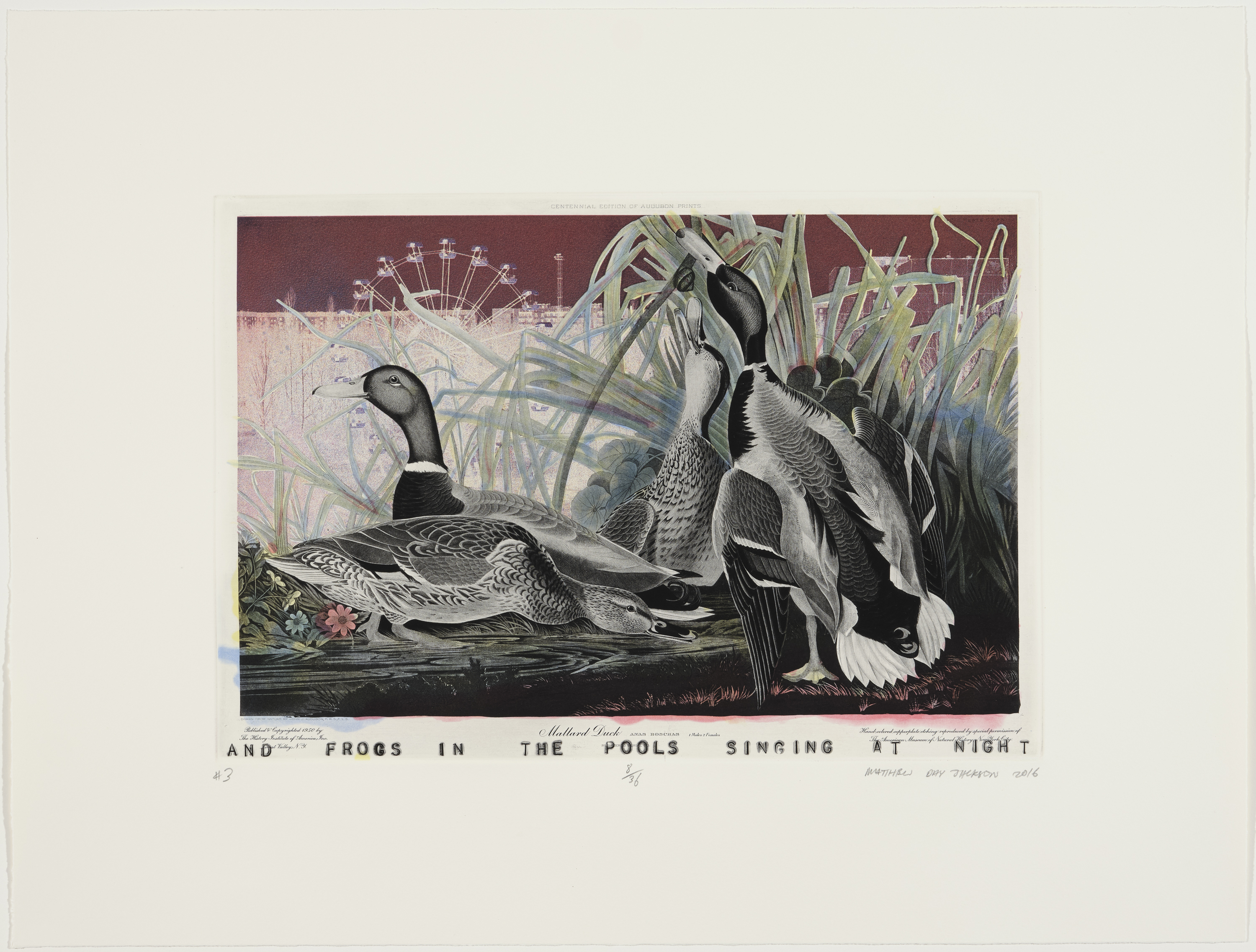New Exhibition Brings Works From Acclaimed Artists To The High Desert Museum (Photo) - 04/17/24
April 17, 2024
Savor renowned artwork by Kiki Smith, Ann Hamilton, Matthew Day Jackson and Wangechi Mutu while exploring, “Near, Far, Gone: From the Collections of Jordan D. Schnitzer and his Family Foundation”
BEND, OR — Step into a world where art, nature and humanity intersect in the captivating new exhibition Near, Far, Gone: From the Collections of Jordan D. Schnitzer and His Family Foundation, opening at the High Desert Museum on April 20, 2024.
Featuring extraordinary works by Kiki Smith, Ann Hamilton, Matthew Day Jackson and Wangechi Mutu, this exhibition explores the intricate relationship between humans, wildlife and the environment. With each piece drawing inspiration from the natural world, these acclaimed artists delve deep into themes of symbolism, allegory and human-animal connections.
“We are thrilled to show the dynamic and thought-provoking works of Kiki Smith, Ann Hamilton, Matthew Day Jackson and Wangechi Mutu,” says Museum Executive Director Dana Whitelaw, Ph.D., “Through the diverse perspectives of these four acclaimed artists, Near, Far, Gone offers a profound meditation on the interconnectedness of humanity and the natural world.”
Four of the pieces featured in Near, Far, Gone are from prominent German-born American artist, Kiki Smith. Smith’s art often explores themes of embodiment and the natural world, drawing inspiration from a wide range of sources including folklore, religious iconography and scientific illustrations. Her work is characterized by its raw emotional power and intimate exploration of the human experience. Throughout her career, Smith has exhibited extensively internationally and has received numerous awards and honors for her contributions to contemporary art. In 2006 Smith was recognized by TIME Magazine as one of the “Time 100: The People Who Shape Our World.”
Smith’s featured pieces, titled “Pool of Tears II” “Fortune” “Carrier” and “Companions,” take inspiration from folklore and transform the natural world into an almost dreamlike reality. While viewing her work, visitors will have the opportunity to reflect on their relationships with animals—particularly those who act as close companions.
Another Near, Far, Gone featured artist, Ann Hamilton, is a highly respected American visual artist known for her immersive installations. Raised in Ohio, Hamilton studied textile design before earning her MFA in sculpture from the Yale School of Art. Hamilton uses everyday materials such as fabric, paper and sound to create experiential environments that engage the viewer on a profound emotional and intellectual level. Her art has been exhibited extensively worldwide, including prestigious institutions like the Guggenheim Museum and Museum of Modern Art in New York and the Venice Biennale. With her innovative creations, Hamilton continues to push the boundaries of contemporary art, inviting audiences to reconsider their perceptions of space, materiality and the human experience.
Hamilton’s Near, Far, Gone featured screenprint, Peregrine Falcon, is partially blurred suggesting a narrative of conservation and preservation success. In the United States, peregrine falcons are a clear conservation success story. In the 20th century, they disappeared in high numbers due to the insecticide DDT, a chemical that poisoned their food and habitat. The federal government listed the falcon under the Endangered Species Act in 1973. Reintroduction programs and the banning of DDT have aided the bird’s comeback. Now delisted, peregrine falcon populations are stable. After exploring Near, Far, Gone, visitors may have the opportunity to meet a real peregrine falcon during the Museum’s Bird of Prey Encounter. Happening daily at 11:00 am, visitors can meet some of the non releasable raptors in the Museum’s care as wildlife staff explain their unique adaptions.
Matthew Day Jackson—another Near, Far, Gone featured artist—is celebrated for his diverse and thought-provoking work spanning sculpture, installation, painting, and video. Known for his meticulous craftsmanship and innovative use of materials, Jackson's pieces evoke a sense of wonder and contemplation, challenging viewers to confront the complexities of their existence. His work has been featured in major exhibitions worldwide, including a significant showcase at the Pace Gallery in New York City.
Twelve pieces by Jackson will hang in Near, Far, Gone, titled “There Will Come Soft Rains #1-#12.” In the creation of this series, he transformed 1930s copper plates [GU1] etched with Audubon's birds, adding vibrant colors and layers of images. The portfolio's title is drawn from Sara Teasdale's poem "There Will Come Soft Rains," evoking nature's resurgence after devastation. Jackson incorporated one stanza of the poem onto each plate. Notably, several birds depicted in the portfolio are now extinct or critically endangered, like the carrier pigeon and the ivory-billed woodpecker, due to human activities.
The final Near, Far, Gone featured artist is contemporary Kenyan-born American [GU2] artist Wangechi Mutu. In 2019, the Metropolitan Museum of Art debuted her groundbreaking exhibition The NewOnes, will free Us as its inaugural Facade Commission — a prestigious initiative inviting contemporary artists to create temporary installations for the museum's exterior facade. This innovative display marked a historic moment as Mutu’s four bronze sculptures, titled “The Seated I, II, III, and IV” took their place in the museum’s exterior niches which had been vacant for 117 years. [GU3]
Mutu’s works in Near, Far, Gone titled “Seanimal I, II, III, and IV” merge animals with human and monster-like features, blurring the lines between reality and fantasy. Through these fantastical creations, Mutu prompts contemplation on humanity's relationship with nature and the ethical implications of scientific specimen collection and preservation practices.
Through these 19 evocative works, visitors are prompted to contemplate the delicate balance of our coexistence with endangered, threatened and evolving animal species. As we witness creatures transition nearer or farther from human influence, Near, Far, Gone ignites a poignant dialogue about the survival of diverse species and the sustainability of our shared planet.
Near Far, Gone: From the Collections of Jordan D. Schnitzer and His Family Foundation will be on exhibit at the High Desert Museum through September 8, 2024. It’s made possible by the Visit Central Oregon Future Fund and the James F. and Marion L. Miller Foundation with support from Republic Services, Tonkon Torp and Vista Capital Partners.
ABOUT THE MUSEUM:
The HIGH DESERT MUSEUM opened in Bend, Oregon in 1982. It brings together wildlife, cultures, art, history and the natural world to convey the wonder of North America’s High Desert. The Museum is a 501(c)3 nonprofit organization accredited by the American Alliance of Museums, is a Smithsonian Affiliate, was the 2019 recipient of the Western Museums Association’s Charles Redd Award for Exhibition Excellence and was a 2021 recipient of the National Medal for Museum and Library Service. To learn more, visit highdesertmuseum.org and follow us on Facebook and Instagram.
###

